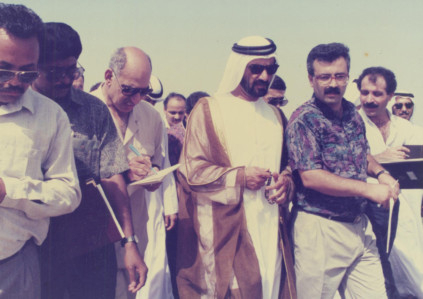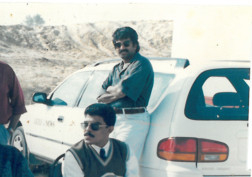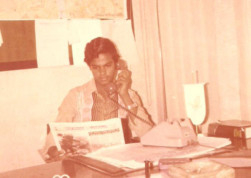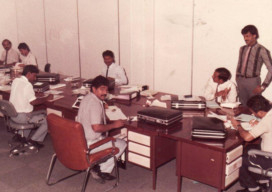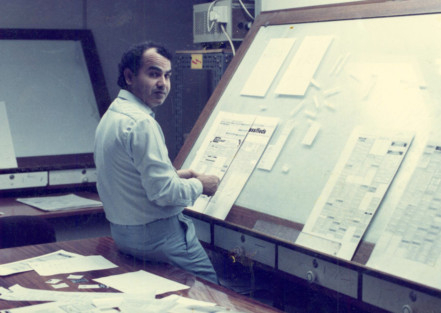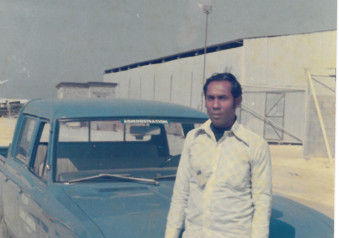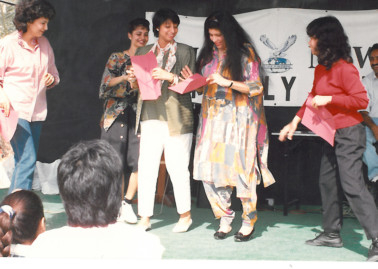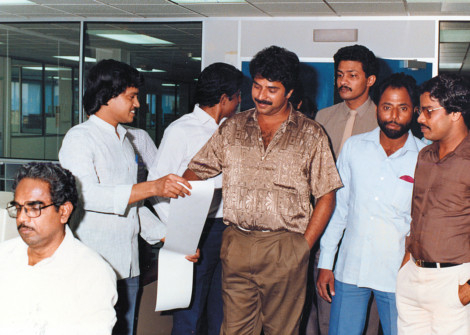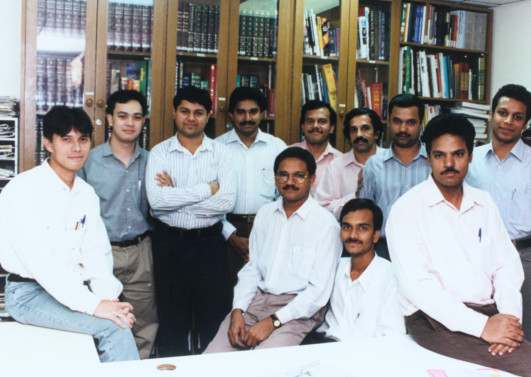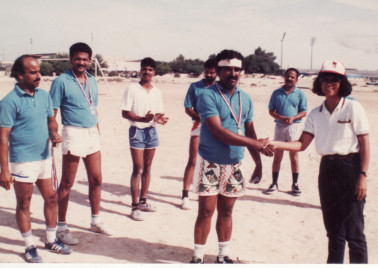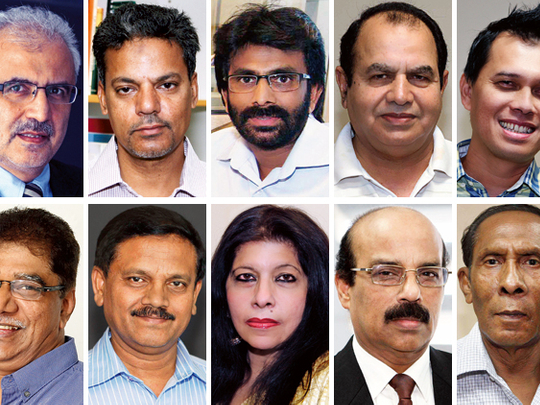
Duraid Al Baik, Editor, UAE
With the company since: 7.9.1985
He had worked as a civil engineer with an American company in Saudi Arabia before joining Gulf News as a reporter. “I had planned to be in the UAE for not more than a year,” says Duraid Al Baik, who has now been with the organisation for close to three decades. “This was supposed to be a stop-gap arrangement to complete my five-year stint in the Gulf that would exempt me from military service in Syria.”
With no inkling of what reporting was, Al Baik confesses to being hired primarily because he was bilingual — a big asset in those days. “When asked where I would like to go for my first story, I chose to go to the Sharjah municipality. As an engineer, I was familiar with visiting the public works departments.”
Al Baik recalls spending time with the technical manager, who gave him all the details on a proposed fountain in Sharjah that was supposed to be the third tallest in the world, after Jeddah and Geneva. Able to understand all the technical specifications, he returned to the office to file his first story and the rest, as they say, is history.
Abdul Kareem, Head of Archive Desk
With the company since: 18.11.1978
At 18, Abdul Kareem joined Gulf News as an editorial coordinator and today, a lifetime later, he is the company’s oldest employee.
Those were the days when newspapers were nerve centres for receiving and disseminating information. “My job was to monitor the teleprinters and each news agency, such as Reuters or API, had a dedicated teleprinter feeding us worldwide news,” says Kareem.
On July 11, 1979, the world watched in panic as Skylab, America’s first manned space station, hurtled towards earth, with no one knowing where it would crash. “The only source of up-to-date information was the newspaper and everyone was calling constantly, worried if the UAE would be affected. I was asked to step in to monitor the telephone lines at night,” recalls Kareem.
Working in a newspaper meant we were aware of all that was happening around the world first, says Kareem, who remembers how the teleprinters would sound an exciting “ting-ting-ting” every time there was any breaking news, and everyone would rush to see what it was. “It was a heady feeling to know something before the rest of the world got to know.”
Oravil Shaukath Ali, Public relations officer
With the company since: 17.2.1982
Ask him what he is most proud of, and Shaukath Ali will tell you that it is the company’s astounding growth. And what better testimony to this than the fact that three generations of his family have worked in Gulf News. “My father was here from the very beginning and retired in the late 80s. I’ve been here since 1982 and my son joined the IT department in 2011. We don’t need to go anywhere else,” says Ali, who joined the company as a newsboy in the circulation department.
He then went on to become a driver and eventually the public relations officer. “My job is like getting a child ready for school — I handle the visa, immigration, medical tests and Emirates ID for all the employees who join us.”
From a sleepy town to a bustling metropolis, Dubai’s growth mirrors that of Gulf News, says Ali, who talks of a time when it would take five minutes to reach Bur Dubai, and ten to the airport from the Gulf News office on Shaikh Zayed road. “You could just walk across Shaikh Zayed road — there would be more camels ambling about than humans,” says Ali, recalling the camel-crossing sign outside the old Gulf News office on Shaikh Zayed road.
Humayan Akhtar, Pre-press Operator
With the company since: 22.10.1979
The production department had a vacancy for a cut-paste artist, and Humayun Akhtar’s experience in an advertising agency in Lahore landed him the job. But it wasn’t the laborious process of creating a newspaper page that excited Akhtar — it was cricket.
He was so passionate about the sport that the sports desk would often seek him out to confirm or clarify aspects of the game. And then came Akhtar’s moment of glory in 1981, when Sunil Gavaskar’s team took on Javed Miandad’s in Sharjah. “The sports editor brought a book written by Sunil Gavaskar to be reviewed for the next day’s edition, and knowing how I felt about the sport, he offered it to me to read first,” says Akhtar, who chanced upon a few errors and inconsistencies in the book.
The next day, the review ran with a special mention on the errors spotted by Akhtar and Gavaskar was shown the article. “Gavaskar sent me a letter apologising for the mistakes,” says a beaming Akhtar who, until a few years ago, was given VIP passes to India-Pakistan matches.
“Gulf News and this city have given me all I could ever ask for,” says Akhtar, who calls Dubai his homeland.
Patrick Masahud, Systems Editor
With the company since: 29.11.1992
He was offered positions in sales and the hospitality industry, but Patrick Masahud joined Gulf News as a Deputy Librarian instead. “I chose Gulf News as it was a reputable company, and having done extensive research for my college degree, the position of librarian suited me.”
Contrary to people’s expectations, the library was a lively place, recalls Masahud. “There was no internet then, no emails, no Facebook and no Twitter. Editors would constantly pop in to read newspapers, magazines and books and there would invariably be a heated discussion on the latest happenings of the day.”
In 1996, when Gulf News entered the internet world, Masahud was one of the editorial staff asked to take part in training on how to access the internet and e-mails. “I was thrilled when given the task to upload the first Gulf News web page on September 1, 1996,” recalls Masahud — definitely a gold star day of his career.
Mohamed Iqbal, Loading Foreman
With the company since: 23.4.1980
Mohamed Iqbal joined the company as a distributor and has since worked in the circulation department, ensuring that the newspaper reaches homes and offices across the emirate. “I was happy to get the job, but everyone I knew kept asking why I had joined the paper and thought I had made a wrong decision,” says Iqbal. In those days, Gulf News distributed barely 5,000 copies. “I would tell everyone that it would be alright, and to just give the paper time.”
In 1985, the year the paper was relaunched, Iqbal was recognised as the only distributor to meet his targets. “I was allocated the Jumeirah area, and night after night I would be out with my newsboys, ensuring we did it right,” recalls Iqbal.
The climb to the top hasn’t been easy. “I remember standing at traffic signals with the newsboys and seeing people throw the paper out of their cars,” says Iqbal, “But those days are long gone and we have never looked back.”
Mohammed Ukkayil, Senior Data Entry Operator
With the company since: 22.10.1979
Those were the good old days, when you could just waltz into the Gulf News office, ask for a job and get one immediately. And that is exactly how Mohammed Ukkayil (known to all as Mamu) ended up as a typesetter for the production department in late 1979.
But those were also the days when the paper was in its infancy and it was all hands on deck to ensure that the newspaper achieved maximum visibility. “The GM asked many of us if we would be willing to moonlight as newspaper boys,” recalls Ukkayil, who jumped at the opportunity.
“I would come into the office and work for eight hours on my regular job, then collect the papers to sell in Deira and Al Ghurair Centre. After finishing the distribution rounds, I would stand at the Clock Tower traffic signal from six to ten in the morning selling the paper,” says Mamu of a gruelling routine that he maintained for more than seven years — and one that he gave up only on doctor’s orders as his health had begun to fail.
“Yes it was about the extra money, but it was also about the paper. I have played a part in making Gulf News what it is today,” Mamu says with pride.
Nagma Siddiqi, Telephone Operator
With the company since: 6.3.1986
She joined the company as a receptionist and for most people visiting Gulf News, hers was the pleasant face that greeted them. And now, for years as a telephone operator, Nagma Siddiqi’s distinct voice is the first point of contact for anyone getting in touch with the company.
Siddiqi fields more than a 1,000 calls a day. “Once the phone starts ringing it never stops. And there is no time or place to let your emotions get in the way. You have to be polite and helpful at all times,” she says.
From irate subscribers to international media, Siddiqi answers all queries, calms down nervous citizens and firmly handles any curveballs thrown her way. “Whether there is an earthquake, building collapse, sand storm, fire or volcanic ash — people call Gulf News expecting help, the latest update or for someone to just set things right,” says Siddiqi.
For what sounds like a thankless job, Siddiqi takes immense pleasure when, “People who have left the country come back and call and remember my voice and ask how I’ve been or call back just to thank me because I’ve helped them and made them feel better.”
Thomas Philip, Account Group Manager
With the company since: 9.9.1979
Today, when you join most departments in Gulf News, it will take you the better part of the day to meet and greet everyone, but when Thomas Philip joined the company in 1979 as a supervisor, it took him not more than 30 minutes to get acquainted with all the staff.
Philip remembers a turning point for Gulf News was when it relaunched in 1985. “That was the year when we had the most significant drive to overtake our rivals and became the number one newspaper in the UAE. We surpassed our targets, and the achievement was very personal to me because of the effort and dedication that we all put in. There were times during this initiative that I did not see my children for days altogether.”
Like most of the old timers at the company, Philip remembers the halcyon days with fondness, tinged with a smidgeon of regret at the loss of what he calls “bonding”. “I have always considered Gulf News one big family. As we grew bigger, we also began to grow apart. It would be nice to see the same get-togethers and family time as well as a revival perhaps of the Gulf News club which organised football, cricket and badminton events.”
Mohammed Ebrahim Mohamed Moideen, Documentation Clerk
With the company since: 2.8.1979
Talk to Mohammed Ebrahim, and you might think he was Gulf News’s Man Friday. From driving reporters and photographers around town for their stories, delivering papers to Abu Dhabi in the dead of the night, to standing for hours at the airport to receive every new Gulf News employee — from editors to newsboys — there isn’t much he hasn’t done in 34 years with the company.
“There was a time when I clocked more than 800 hours a month in just overtime,” says Ebrahim. “I was doing everything from putting together employee pay packets (these were pre-banking days) where you have to be exact right down to the last fil, to setting up the accommodation for the newsboys before picking them up from the airport.”
And through all this he was busy dispensing sound advice to all the zealous sorts who would land in Dubai and want to zip straight off to buy a car, rent a villa or invest in gold. “I would tell them to take it easy, work, save, send money home and then think about getting a fancy car,” he says.



